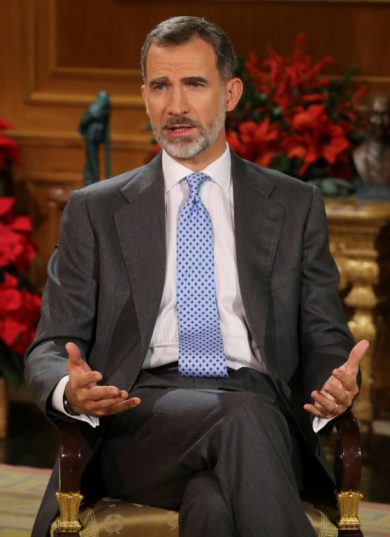Spain's former king Juan Carlos I, who turns 80 on Friday, makes a public comeback with his son Felipe VI at the weekend after complaining bitterly of being left on the sidelines.
The show of unity comes at a trying time for Spain after its wealthy Catalan region attempted to break away, and where 47 percent of voters want to live in an independent, monarchy-free republic.
Credited for leading Spain to democracy after decades of dictatorship, Juan Carlos will appear at a military ceremony Saturday in Madrid alongside Felipe, who replaced him in June 2014 after a tearful abdication following several royal scandals.
“Father and son haven’t been seen together at an institutional event for seven months,” says Ana Romero, author of a book on the latter years of Juan Carlos’s reign.
– Left on sidelines –
Widely lauded for his negotiating skills, political acumen and role in defusing an attempted coup in 1981, Juan Carlos fell from grace during Spain’s economic crisis as his lavish lifestyle drew anger.
Adding fuel to fire, his youngest daughter Princess Cristina and her husband Inaki Urdangarin were embroiled in a corruption and tax fraud investigation, with the latter since found guilty of siphoning off millions to fund a lavish lifestyle. Cristina was acquitted.
When he took the throne, Felipe VI, 49, took his distances in a bid to restore the image of the monarchy.
In June, Juan Carlos was markedly absent from an event marking 40 years since the first democratic elections after Francisco Franco’s dictatorship.
Jose Apezarena, Felipe VI’s biographer, says the explanation given at the time was that he didn’t show up “so as not to outshine his son.”
But “people close to him conveyed his unease, he was angry at having been excluded.”
But that “really hurt” the man who reigned 38 years because “it was thanks to him that there was an exemplary transition from a dictatorship to a full democracy,” adds Jaime Penafiel, a royal affairs journalist.
So “he made it known that if they humiliated him again, he would go celebrate his 80th abroad.”
– Reluctant abdication –
So it is that on Saturday, Juan Carlos and his wife Sofia will accompany Felipe VI and Queen Letizia to a ceremony held annually to mark the start of the year for the military.
Four years ago, that same ceremony had been a torture for Juan Carlos, physically weakened after health issues and tainted by scandals.

King Felipe VI has not been seen with his father at a public event for months
“He made mistakes in his speech, lost track of what he was saying, offering a pathetic spectacle,” says Apezarena.
That’s when he asked for preparations to be made for his abdication, he adds.
Later that year in June, he stepped down in favour of his son and became “king emeritus,” a title he hates according to the press.
For Penafiel, “it wasn’t what he wanted as he had repeatedly said he would be king until he died.”
He would have preferred the fate of King Harald V of Norway, who is still in power and in May celebrated his 80th birthday with a big bash attended by other European royals.
– Low-key celebrations –
So why isn’t Spain doing that for Juan Carlos?
“He isn’t king anymore, and the Spanish monarchy has more of a tradition of austerity than the northerners,” says Apezarena.
Celebrations are planned to mark his birthday and that of Sofia this year, but “lower key,” he adds.
At his family birthday meal on Friday, Princess Cristina and Urdangarin are expected to be conspicuously absent.
“The more they are kept away, the better it is” for the royals, says Apezarena.
And while Juan Carlos was once criticised for his lavish lifestyle — going on a luxury elephant hunt in Botswana at the height of the economic crisis, for instance — he is still widely admired for his role in Spain’s recent democratic history.
With the passing of time, the risk of him outshining his son is dwindling, says Apezarena — even if Juan Carlos was named world sailing champion in September aged 79.
Support Local Journalism
Add The Citizen as a Preferred Source on Google and follow us on Google News to see more of our trusted reporting in Google News and Top Stories.








